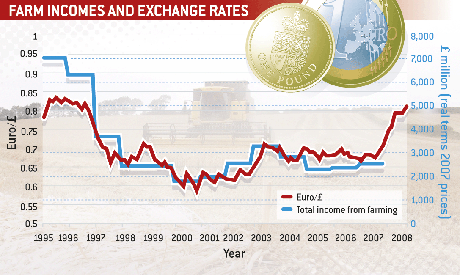Farm incomes to benefit from sterling’s weakness

Prospects for UK farm incomes are looking more positive, despite the immediate problems of rising input costs, lower commodity prices and a soggy harvest.
The more buoyant forecast is based on the strong correlation between the £/euro exchange rate and Total Income From Farming, (see graph). This shows that, as sterling weakens, so farm incomes rise.
Earlier this week, the £ reached a record low against the euro, prompted by lousy figures from the housing market and comments from the Chancellor Alastair Darling that the UK economy was on the slide.
At its low point on Tuesday (2 September), the pound was worth just 0.8162 against the euro – in other words, it would cost 81.6p to buy €1. As Farmers Weekly went to press on Wednesday it had improved slightly to 81.3p.
According to NFU chief economist Carmen Suarez this is good news for UK farming. “Overall, a weaker sterling has a positive impact on farming revenues via an increase in the competitiveness of our exports, a decrease in the competitiveness of imports and an increase in sterling-converted support payments,” she said.

The effect on the single farm payment is particularly pronounced. If the current rate of 81.3p/euro persists to 30 September – the day on which the EU Commission converts the SFP from euros to sterling – the UK would benefit from a 17% increase in support over last year.
According to farm business consultants Andersons, an English cereal grower will see his 2008 SFP rise to about £224/ha, up from £204/ha last year. Had there been no change in the exchange rate, this would have dropped to just £192/ha.
Not everyone will gain equally, however. Varying rates of national modulation will nullify some of the gains, with English farmers having 13% of their SFPs cut compared with 12% last year, and Scottish farmers losing 8%, up from 5%.
Farmers will also see varying effects on the value of their produce. Even though over two-thirds of UK agricultural trade is with the euro-zone, some commodities are more influenced by domestic supply chains and will gain less from the currency shift.
Imported inputs will also become more expensive as a result of the weaker pound.
“Two thirds of the machinery UK farmers buy come from the euro-zone and, compared with January 2007, sterling is now 20% lower,” said Agricultural Engineers’ Association economist Chris Evans. “Most manufacturers have already posted double digit increases on the back of steel price rises, but there is more to come.”
Despite all this, Ms Suarez insists that, on balance, the UK agriculture sector will benefit from the weaker currency.

